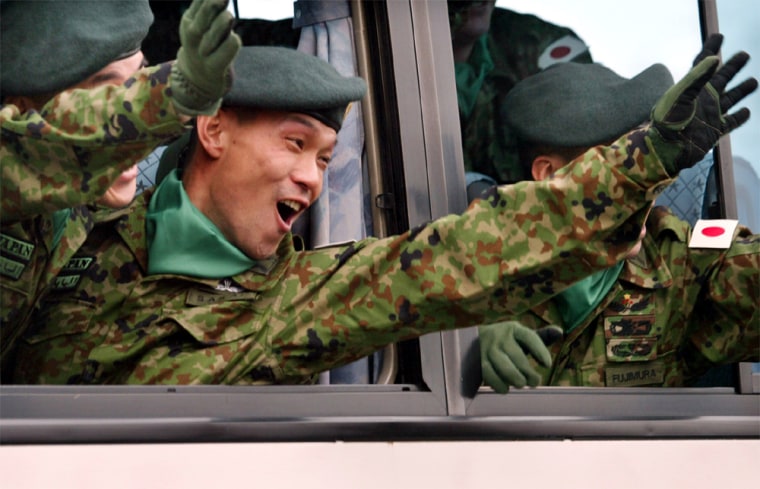After months of national debate and parliamentary deliberations, Japan this week will begin sending more than 500 of its Ground Self Defense Forces to southern Iraq in what will be the nation's largest military deployment since World War II. They will join other members of the U.S.-led coalition involved in humanitarian and reconstruction projects in the city of Samawah.
"All of you will be implementing the two most important policies for our peace and prosperity: U.S.-Japan alliance and international cooperation," Prime Minister Junichiro Koizumi said Sunday during the official send-off ceremony. "And this will be carried out not with words but with action."
What makes this particular deployment unique is that in the past, Japanese peacekeeping missions have always taken place in either a post-combat, or at least a non-combat, environment.
In the case of Iraq, for the first time in Japan's postwar history its troops will be entering a hostile environment that may require the use of weapons as a means of self-defense.
More active roles
Since the end of the first Gulf War, Japan has slowly and discreetly sought more active participation in international peacekeeping efforts.
Starting with the dispatch of minesweepers to the Persian Gulf in 1991, Japanese troops have been sent to Cambodia, East Timor, and most recently to the Indian Ocean, where Maritime Self Defense Forces provided the U.S. military with logistical support in the war against terrorism in Afghanistan.
Nevertheless, Japan has also been routinely criticized for "checkbook diplomacy," notably during the first Gulf War in 1991 when Tokyo failed to mobilize its troops.
Instead, Japan contributed $13 billion in aid during the conflict.And since minesweepers were deployed only after the conflict ended, Japan was seen as a rank below those nations who took the risk needed in securing global stability.
Determined to avoid a repetition, Prime Minister Koizumi — during a visit to President Bush's ranch in Crawford, Texas, last May — promised that Japan would consider a new law which would allow for the Japanese troops to participate in the reconstruction of Iraq.
On Monday, Deputy Secretary of State Richard Armitage, in Japan for a two-day visit as part of a tour of Asia, underscored the importance of Japan's involvement in Iraq as key to deepening the alliance with the United States.
Armitage said that the dispatch was earning Japan respect that it would not have won by only contributing money to Iraqi reconstruction.
“It’s such a historic moment in the life of your nation and indeed of our alliance,” Armitage said at the Japan National Press Club.
“In this time of change at home, in the region and around the world, Japan has not been caught standing still,” he said. “Japan is putting its skillful hands on the tiller of the international community, no longer content with simply being a passenger.”
Break from pacifist tradition
The deployment to the still hostile environment remains a hot topic in Japan, where critics view it as contravening Japan's pacifist tradition.
Under the controversial Article 9 of Japan's constitution drafted with the United States after World War II, Japanese troops are prohibited from engaging in the act of combat unless the nation is under attack.
As a result, when a special law was passed in July to allow for Japanese troops to conduct relief and humanitarian efforts in Iraq, the scope of the operation was limited to areas deemed as "non-combat zones."
Only after numerous survey missions and information gathering, the relatively stable city of Samawah was selected as their final destination.
But as the local media continue to broadcast daily images of terrorist attacks against coalition forces and civilians in Iraq, many in Japan have started to raise concern about the legitimacy of the nation's involvement in what appears to be a still on-going military conflict.
There are concerns that Japan's pacifist constitution would be compromised should the troops use their arms for self protection. Others fear that the Self Defense Forces are ill-equipped and ill-trained to face a dangerous mission overseas.
Nobutaka Tsutsui of the leading opposition party, Minshuto, posed the question to the Defense Minister during a recent Lower House Budget Committee, "Just because you can't identify your attackers, would you still call it a non-combat zone?"
Watershed in Japanese diplomacy
Others, including Koizumi, consider this dispatch a watershed for Japan's diplomacy.
During his annual general policy speech earlier this month, the Koizumi explained to the Parliament, "If we only made material contributions and allow other nations to take personal risks because of the danger involved, we are not be fulfilling our responsibilities as a member of the international community."
But even as the Koizumi administration gears the nation for more active participation in matters of global security, Professor Yoshihide Soeya at Keio University points out that there is one other departure from past peacekeeping operations.
"The big difference this time is that up until Afghanistan, there has always been U.N. approval. But the operation in Iraq is being conducted under the Bush administration's agenda which is at odds with the international community and this has caused a big headache for Japan."
